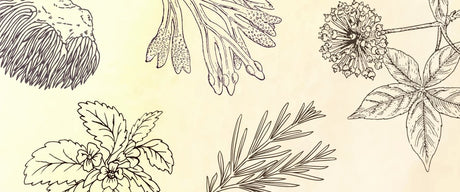Chaga (Inonotus obliquus) is a woody, coal-coloured parasitic fungus with a golden interior. It lives in sync with the birch tree through a symbiotic relationship. Unlike most mushrooms, its texture is dense, coarse and crumbly - making for a more challenging foraging experience. This King of the Fungal Forest has earned a reputation as one of the most healthful foods on the planet, containing 31 times more antioxidants than blueberries! Offering over 200+ phytonutrients, vitamins, and minerals, it’s no wonder Chaga has become a staple for immune health and beyond in the world of wellness.
Disclaimer: This blog is for educational purposes only and is not a substitute for medical advice. Please consult your health care practitioner before adding any new herbs to your wellness routine.
History of Use
Found predominantly in the boreal forests of the Northern hemisphere, Chaga has been considered a sacred healing tonic and folk medicine by many indigenous and Northern cultures. Cree healers refer to it as pōsākan, the Ojibway call it Cha’a’ihtthi, and the Japanese call it kabanoanatake.
Also known as the “King of Mushrooms”, the use of Chaga dates back thousands of years. In the 12th century in western Siberia, the Khanty peoples would drink this functional mushroom in a tea to aid digestion and detoxification. They also used it topically by creating a soap that soothed any sores on the skin. From the 16th century onward, it was used regularly in Russia to treat cancer and tumors.
By the 1950’s, Chaga was used widely throughout Asia to support immune function, and it was officially recognized as a medical treatment in Russia. Since then, more research has been done to confirm the benefits of this functional mushroom.
The Benefits of Chaga
Strengthens Immune Function
Packed with antioxidants that act as a defense system, Chaga works both preventatively and restoratively to build optimal immune health. Polysaccharides and beta-glucans within Chaga modulate the immune system, reduce inflammation, and help ward off infection and viruses (1).
Repairs Cellular Damage
As we age, our bodies require more help to protect our DNA from damage. Chaga mushroom is especially high in a compound called superoxide dismutase (SOD). This antioxidant-rich enzyme neutralizes free radicals, maintains tissue health, and has been shown to be a promising cancer preventative (2).
Lowers Blood Sugar
Chaga regulates blood sugar levels and can be a beneficial functional food for diabetics. Regular consumption of Chaga can raise glucose levels that are too low, reduce glucose levels that are too high, and lower insulin resistance (3).
Boosts Energy Levels
Many people who consume Chaga tea regularly report a surge in energy and mental clarity after drinking it. Packed with a wealth of nutrients to keep us feeling vital, The King of Mushrooms works to improve the uptake of energy metabolism, allowing our bodies to access the energetic benefits from Chaga’s nutrients (4).
Promotes Skin Health
In Traditional Chinese Medicine, Chaga is believed to preserve youthfulness, and its antioxidant content helps to slow down the signs of aging (5). Chaga can also shield our skin from ultraviolet (UV) damage by reducing the pro-inflammatory cytokines brought on by UV radiation (6).
Curious to learn more about functional mushrooms? Visit our Mushroom Blog and dive deeper into the benefits of these herbal allies.





























